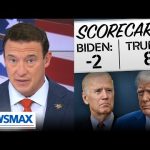Dr. Patrick Soon-Shiong told Megyn Kelly what every hardworking American who has watched a loved one suffer through chemo and radiation already suspects: for some cancers those brutal treatments do more harm than good by shredding the very immune cells that keep us alive. He pointedly argues that chemotherapy and high-dose radiation can obliterate natural killer and T cells — the blood’s frontline soldiers — leaving patients vulnerable to relapse and infection instead of cured. This isn’t comforting speculation; it’s a challenge to half a century of medical dogma that treats the patient as collateral damage in the hunt for tumor shrinkage.
What Dr. Soon-Shiong and his team have been pushing instead is an immune-first strategy built around IL-15 biology — what they call a Cancer BioShield — designed to restore and supercharge natural killer and T cells so the body can finish the fight it was made to win. The company behind the work won FDA approval for ANKTIVA (N-803) in April 2024 for a specific bladder-cancer indication, and the data they present show long-lasting complete responses and memory T-cell formation in some patients. For the conservative who believes in life, liberty, and the right to sensible medical innovation, this is the kind of breakthrough Washington should celebrate rather than slow-walk.
Yet the story is also a reminder of how bureaucracies and entrenched interests can stall progress. The approval of ANKTIVA came only after years of trials and regulatory back-and-forth, and mainstream outlets reported how the therapy’s commercial launch followed intense scrutiny over manufacturing and efficacy. Americans should be asking why a treatment that purports to protect the immune system — and promises durable remissions without the usual carnage of chemo — didn’t get an easier path to patients hungry for hope.
Even as critics howl, the FDA has in 2025 taken steps that vindicate the immune-first skeptics: RMAT designation and Expanded Access authorizations have been granted for ImmunityBio’s platform to treat lymphopenia and support patients with solid tumors, and the company has presented data at ASCO suggesting survival benefits when lymphocyte counts are rescued. Those regulatory moves prove two things — the science may be sound, and the system can be made to work when pressure and evidence force it to. But they also expose the painful truth that Americans lost precious time while regulators and big players debated textbooks instead of lives.
This debate isn’t academic. For decades our medical establishment measured success by tumor shrinkage and progression-free intervals while too often ignoring long-term survival and quality of life. Soon-Shiong calls out the “maximum tolerated dose” doctrine for pursuing short-term victories at the expense of immune collapse, and conservatives should applaud anyone willing to challenge a medical elite that rewards incremental gains and fat R&D budgets over honest cures. Patients deserve therapies that preserve their bodies and dignity, not bureaucratic defenses of the status quo.
If Americans care about results and individual freedom, we should insist on faster adoption of promising, patient-sparing therapies, greater transparency from regulators, and incentives that reward cures rather than endless marginal fixes. Dr. Soon-Shiong’s work is not a partisan play — it is a patriot’s plea to put people over paperwork, innovation over inertia, and hope over habit. Washington and Big Pharma can either stand in the way or get out of the way; the choice will define how many families get to see another birthday.




